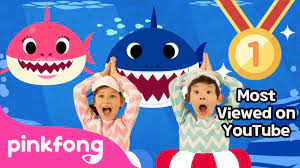.jpg)
Introduction
In recent years, a children's song called "Baby Shark" has taken the world by storm. This catchy tune has become an internet sensation, capturing the hearts of young children and even adults. In this article, we will delve into the origin, popularity, educational benefits, controversies, and cultural impact of the "Baby Shark" song.
The Origin and Popularity of "Baby Shark"
The origins of "Baby Shark" can be traced back to traditional children's songs and campfire chants. The song gained widespread popularity when a South Korean educational company, Pinkfong, released their animated version on YouTube in 2016. Its simple melody, repetitive lyrics, and charming characters quickly captivated young audiences around the world.
The Catchy Melody and Lyrics
One of the main reasons for the success of "Baby Shark" is its catchy melody and easy-to-learn lyrics. The repetitive structure of the song, with its distinct "doo-doo-doo-doo-doo" hook, makes it instantly recognizable and memorable. Children are drawn to the simple and repetitive nature of the tune, which encourages active participation and engagement.
Viral Sensation and Global Impact
"Baby Shark" became a viral sensation, spreading across social media platforms and captivating audiences globally. The song's popularity reached unprecedented heights, garnering billions of views on YouTube and inspiring countless user-generated videos. Its influence extended beyond the virtual realm, with families, schools, and even sports teams incorporating the song into their activities and performances.
"Baby Shark" and Early Childhood Development
The appeal of "Baby Shark" extends beyond its catchy melody. The song incorporates elements that align with early childhood development principles. The repetition in the lyrics helps children with language acquisition and memory retention. The song also introduces basic concepts such as family relationships, counting, and body movements, fostering cognitive and motor skill development.
Educational Benefits of the Song
Despite being initially intended for entertainment purposes, "Baby Shark" has proven to have educational benefits. The song can be used as a tool for teaching children about marine life, body parts, and counting. Many parents and educators have recognized the song's potential to make learning fun and engaging for young children, incorporating it into their curriculum and educational activities.
Controversies and Criticisms
Like any cultural phenomenon, "Baby Shark" has not been without its share of controversies and criticisms. Some argue that the song's repetitive nature can be irritating for adults and that the extensive exposure to the song may have negative effects on children's attention spans. Additionally, concerns have been raised about the commercialization of the song and its impact on consumerism among young children.
The Evolution of "Baby Shark"
Over time, "Baby Shark" has undergone various adaptations and remixes. Different versions of the song have emerged, incorporating new characters, dances, and musical styles. The song has evolved from a simple children's tune to a cultural phenomenon that continues to capture the imagination of children worldwide.
Merchandising and Commercial Success
The success of "Baby Shark" has extended beyond the digital realm. The song's popularity has led to a plethora of merchandise, including plush toys, clothing, and accessories. "Baby Shark" has become a brand in itself, generating substantial revenue through licensing deals and partnerships with various companies.
Impact on Popular Culture
The influence of "Baby Shark" on popular culture cannot be understated. The song has been referenced in television shows, movies, and even during professional sports events. It has become a cultural reference point, with people of all ages recognizing the tune and its accompanying dance moves.
"Baby Shark" as a Cultural Phenomenon
"Baby Shark" has transcended its status as a simple children's song to become a cultural phenomenon. It has united people across generations and cultural backgrounds, serving as a shared experience and a source of joy. The song's ability to create a sense of community and bring people together is a testament to its cultural impact.
Parental Reactions and Annoyance
While "Baby Shark" has garnered immense popularity among children, some parents have expressed mixed feelings about the song. The repetitive nature and constant exposure to the tune can be tiresome for adults, leading to what some have termed the "Baby Shark" fatigue. Nevertheless, many parents acknowledge the song's positive effects on their children's development and enjoy seeing their little ones engaged and entertaned.
Adaptations and Remixes
The success of "Baby Shark" has inspired countless adaptations and remixes. From different languages to genre-specific renditions, artists and content creators have put their unique spin on the song. These adaptations have allowed "Baby Shark" to maintain its relevance and continue captivating new audiences.
Baby Shark in Different Languages
"Baby Shark" has been translated into numerous languages, making it accessible to children around the world. The song's universal appeal lies in its simplicity, allowing for easy adaptation to different cultures and languages. This multicultural adaptation has further expanded the song's global reach and cemented its place as a cultural touchstone.
Conclusion
The "Baby Shark" song has become a global phenomenon, captivating the hearts of young children and creating a cultural ripple effect. Its catchy melody, repetitive lyrics, and educational elements have made it a valuable tool for early childhood development. While some may find it repetitive or commercialized, the song's impact on popular culture and its ability to unite people worldwide cannot be denied.




0 Comments